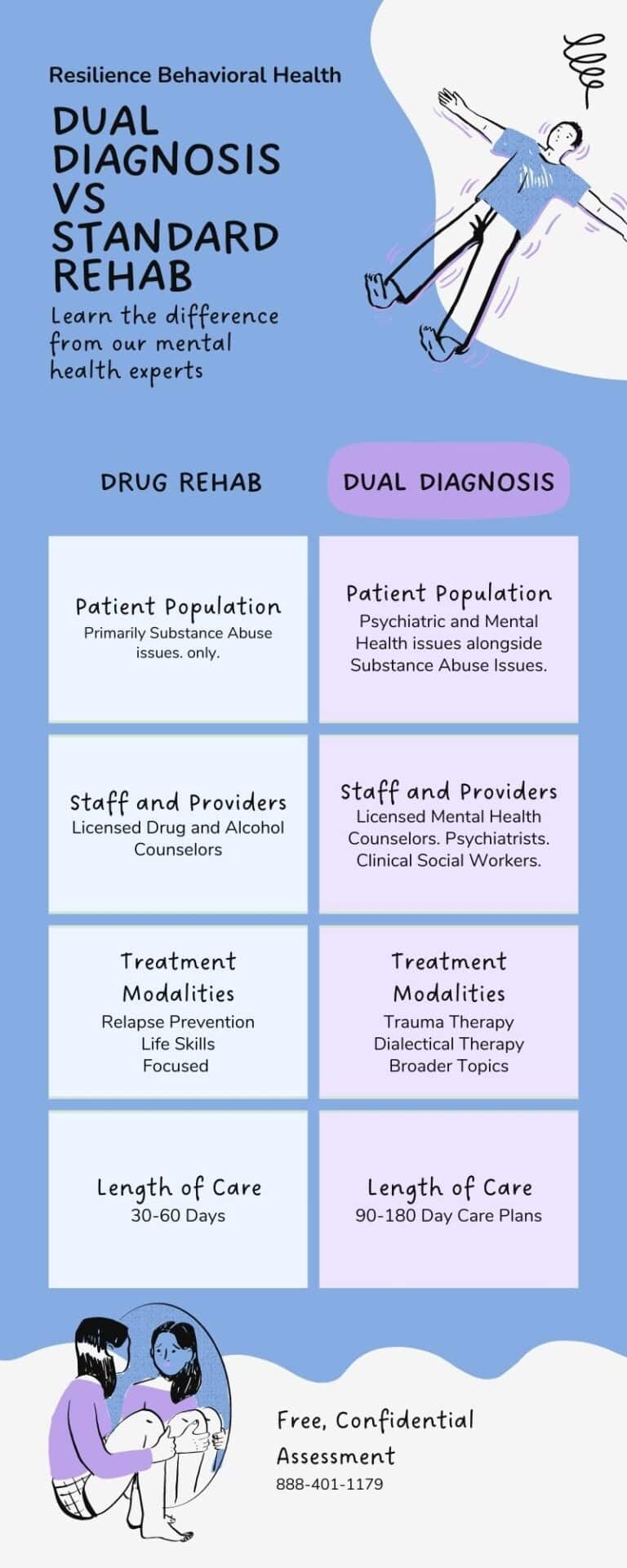What types of programs are provided in Dual Diagnosis Treatment?
A dual diagnosis treatment center is a facility that provides integrated treatment for individuals dealing with both a substance use disorder and a mental health disorder. The goal of these centers is to address both issues simultaneously in order to improve the overall well-being and chances of recovery of the patient. Treatment may include a combination of medication, therapy, and support services to address the complex needs of these individuals.
Dual Diagnosis Treatment can be provided at the Detoxification, Residential, Partial Hospitalization, and Intensive Outpatient levels of care.
According to the National Alliance on Mental Illness (NAMI), approximately 1 in 5 adults in the United States experiences mental illness in a given year. This statistic may vary in different regions and populations, including Massachusetts. It’s important to note that mental health is a complex and multifaceted issue, and the prevalence of mental health issues may be difficult to quantify accurately.
Resilience Behavioral Health provides Dual Diagnosis Treatment and Co-Occurring Rehab Program in Massachusetts. The program can be accessed remotely via telemedicine or in-person.

What is a Dual Diagnosis Residential Rehab Program?
A dual diagnosis treatment center is a facility that specializes in treating individuals who have both a substance use disorder and a co-occurring mental health disorder. Depression, anxiety, bipolar disorder among others are treated. This type of treatment center recognizes the complex interplay between substance abuse and mental health issues. It provides integrated, comprehensive care to address both issues simultaneously.
On the other hand, a standard substance abuse treatment center typically focuses on treating substance use disorders alone. It may not address underlying mental health conditions. Although substance abuse treatment centers may provide some mental health services. T hey may not have the specialized expertise or resources to address the unique needs of individuals with co-occurring disorders.
Overall, the main difference between a dual diagnosis treatment center and a standard substance abuse treatment center is the level of care and expertise. Dual diagnosis treatment centers offer comprehensive and integrated care. They address both substance abuse and mental health issues. Standard substance abuse treatment centers typically focus solely on substance abuse treatment.
What is a Dual Diagnosis Partial Hospitalization program?
A dual diagnosis partial hospitalization program is a comprehensive treatment approach for individuals with co-occurring mental health and substance use disorders. Following the American Society of Addiction Medicine (ASAM) criteria, it aims to provide intensive care in an outpatient setting. (Citation: ASAM Criteria)
This program offers a structured environment and a range of therapeutic interventions to address both conditions simultaneously. It emphasizes the integration of mental health and substance use disorder treatment, focusing on individualized care plans. The ASAM criteria guide the assessment and placement of patients into appropriate levels of care, ensuring a tailored and effective treatment approach. (Citation: ASAM Criteria)
By incorporating evidence-based practices, such as cognitive-behavioral therapy, motivational interviewing, and medication management, the program aims to enhance recovery outcomes. It also includes psychoeducation, relapse prevention strategies, and support for family involvement. Through a multidisciplinary team of professionals, including psychiatrists, psychologists, and addiction specialists, individuals receive comprehensive care to address their complex needs. (Citation: ASAM Criteria)
Overall, a dual diagnosis partial hospitalization program based on the ASAM criteria provides intensive, integrated treatment for individuals with co-occurring mental health and substance use disorders, promoting recovery and improved overall well-being.
What is a Dual Diagnosis Intensive Outpatient Program?
A dual diagnosis intensive outpatient program, guided by ASAM criteria, is a comprehensive treatment approach for individuals with co-occurring mental health and substance use disorders. (Citation: ASAM Criteria) This program offers intensive care and support while allowing patients to reside at home or in a stable living environment.
The ASAM criteria serve as a framework for assessing and determining the appropriate level of care for patients in this program. The program integrates evidence-based practices, such as individual and group therapy, medication management, and psychoeducation, to address both mental health and substance use disorders simultaneously. (Citation: ASAM Criteria)
By providing a structured treatment environment, the program helps individuals develop coping skills, relapse prevention strategies, and healthy lifestyle habits. It promotes the active participation of family members and emphasizes the importance of social support networks in the recovery process. The multidisciplinary team of professionals, including therapists, counselors, and psychiatrists, collaborates to ensure individualized care and optimal treatment outcomes. (Citation: ASAM Criteria)
In summary, a dual diagnosis intensive outpatient program, guided by the ASAM criteria, offers intensive and comprehensive treatment for individuals with co-occurring mental health and substance use disorders. It aims to promote recovery, improve functioning, and enhance overall well-being, while allowing patients to continue living in their homes or stable environments.
Is a Dual Diagnosis Treatment Center covered by insurance?
Yes, in the United States, dual diagnosis treatment is typically covered by insurance, including private insurance. Medicaid, and Medicare are also covering this treatment. Under the Affordable Care Act (ACA), insurance plans are required to cover mental health and substance abuse treatment. They must cover the same level as other medical treatment services. This means that individuals with co-occurring disorders have the right to access affordable, comprehensive care.
The level of coverage for dual diagnosis treatment may vary depending on the specific insurance plan. Most plans cover a range of services, including inpatient and outpatient treatment, medication management, and therapy. How to determine your insurance coverage for dual diagnosis treatment? It’s important to contact your insurance provider directly. You can work with the treatment program’s staff to verify your insurance benefits and coverage.
It’s important to note that while insurance can help cover the cost of dual diagnosis treatment, there may still be out-of-pocket costs. This includes copays or deductibles. Some treatment programs may also offer financial assistance. Sliding scale fees for individuals who cannot afford to pay the full cost of treatment are available.
For a completely confidential, free, and expert consultation give Resilience Behavioral Health a call today at (888)-401-1179 and speak with a treatment placement specialist.

